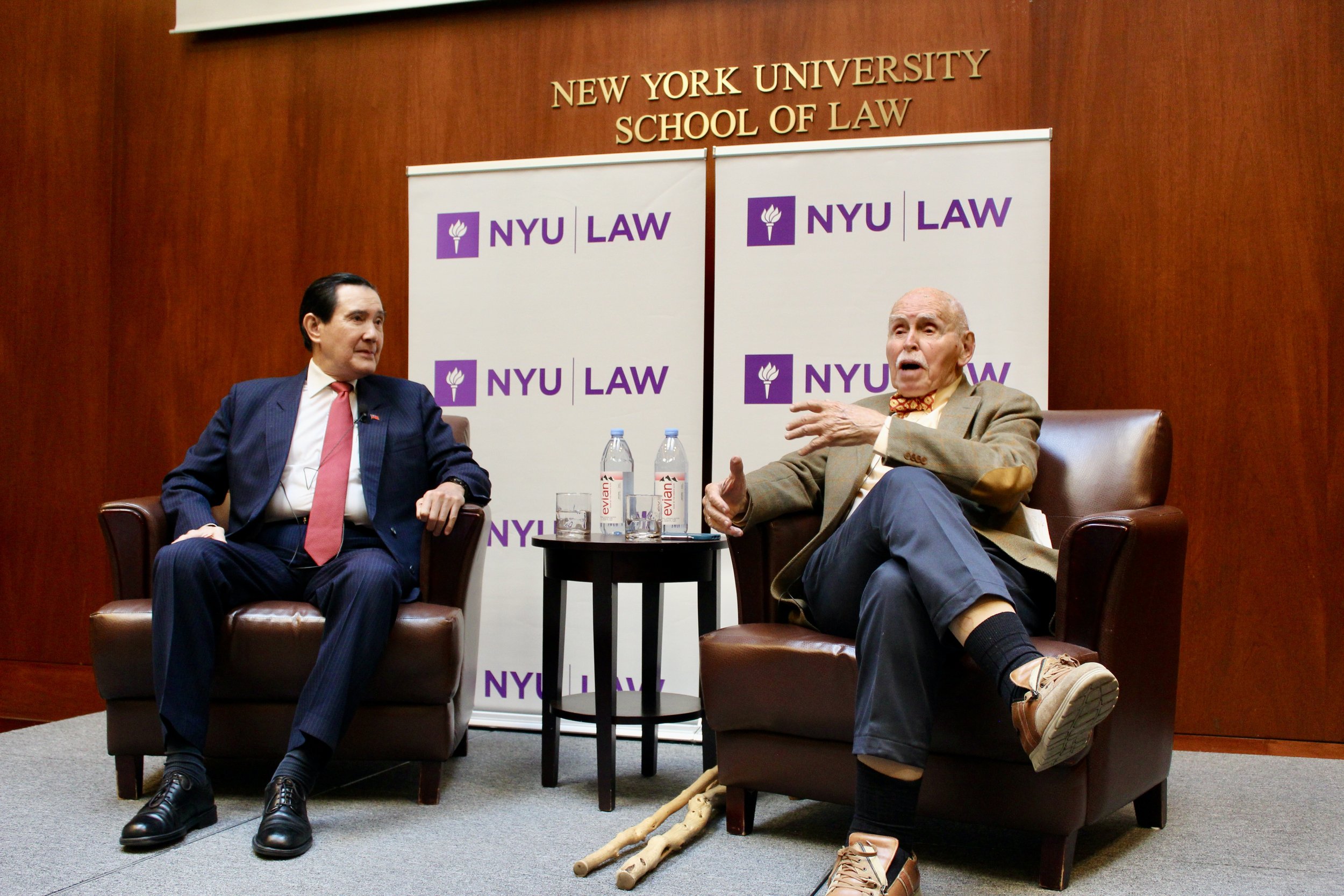“Taiwan is not Ukraine.”
Urges the US to encourage Taiwan-mainland China peace talks
After making opening remarks, Ma (left) took questions from Jerome A. Cohen (right), founding director emeritus of the U.S.-Asia Law Institute, and audience members. Photo by Richard J. Herzfelder.
Former President Ma Ying-jeou of the Republic of China (Taiwan) (LLM ‘76) told a standing-room-only crowd in Lipton Hall on October 16, 2023, that the United States should encourage the government in Taiwan to open dialogue with the People’s Republic of China.
He also rejected comparisons of the Taiwan-mainland China relationship with that of Ukraine and Russia. “This is absolutely wrong. Taiwan is not Ukraine,” he said. Relations between Taiwan and mainland China “are not relations between two countries but relations between two regions.”
Ma was president of Taiwan from 2008-2016, winning two elections as a candidate for the Nationalist (Kuomintang or KMT) Party. As president and since, he has prioritized easing tensions between Taiwan and mainland China. In November 2015, during his final months in office, Ma met with Chinese leader Xi Jinping in Singapore in the first meeting ever between ROC and PRC leaders. Ma made a private visit to mainland China in March 2023.
He accused his successor as president, Tsai Ing-wen of the Democratic Progressive Party (DPP), of risking war with China by advancing an independence agenda, and said worsening relations between the United States and China had given her space to do so.
“Countries that are friendly to the ROC including the United States and the other Western countries should encourage the ROC’s leaders to seek mutual trust and engage in dialogue with mainland China rather than encourage Taiwan’s leaders … to move toward Taiwanese independence or even transforming Taiwan into a second Ukraine,” Ma said. “I believe that the best way to prevent further escalation of tension between the United States and China, which could impact the global order, is for the United States and Western society to encourage peace negotiating between Taiwan and mainland China.”
He added: “Those individuals who view Taiwan as a weapon and intend to turn Taiwan into a battlefield without considering the safety and well-being of the Taiwanese people … are highly unwelcome to the people of Taiwan.”
The best way to prevent further escalation of tension between the United States and China … is for the United States and Western society to encourage peace negotiating between Taiwan and mainland China.
Law Professor Emeritus Jerome A. Cohen, who was founding director of the U.S.-Asia Law Institute, moderated a Q&A session. Members of the audience, comprised mainly of NYU students, alumni, and faculty, challenged Ma’s insistence that cross-strait peace can be maintained if Taiwan’s next president endorses the so-called 1992 consensus, an unwritten understanding reached during a 1992 meeting of representatives of the two sides that the mainland and Taiwan are part of one China. Subsequent statements by leaders on both sides have cast doubt on whether any real consensus was reached in 1992. Taiwan’s status has been disputed since 1949, when the Communist Party won a lengthy civil war and established the PRC in Beijing, while their rivals, the KMT, continued to govern the island about 100 miles offshore.
Public support in Taiwan for reunification has fallen to new lows in recent years as Chinese Communist Party General Secretary Xi Jinping has increased censorship and surveillance at home and rolled back direct elections and suppressed civil liberties in Hong Kong. The KMT candidate in the upcoming presidential election in January, Hou Yu-ih, is trailing the DPP candidate in the polls.
“You are right, mainland China is a totalitarian government,” Ma told one student. “But when I was president of the Republic of China, my strategy was to engage and try to gradually develop friendship and try to change their idea. If you want to fight with them, you are not going to get a result.” He added: “Dealing with … mainland China, it takes a long time. It takes a lot of effort. There is no simple solution.”
He told another student, “Mainland China is so big, so powerful, and so many people, they won’t change overnight. You have to be patient and you have to do it (engage) persistently, otherwise you won’t get any result. … My trip to the mainland (in March) gave me more confidence that mainland China will change eventually.”
After his talk, Ma met with NYU Law Dean Troy McKenzie. His visit to NYU came at the beginning of a week-long trip to the US that also includes a stop in Washington, D.C. As when he visited mainland China in the spring, he brought with him a group of Taiwan students.
